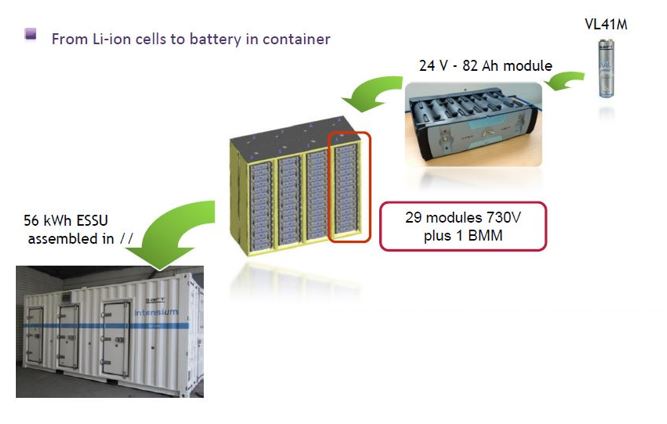|
|
|
|
March 9, 2015 |
![News Photo]() |
In 2015 the International Renewable Energy Storage Conference (IRES) will take place for the first time in collaboration with Messe Düsseldorf and OTTI e.V. more |
|
|
|
|
|
|
November 19, 2014 |
![News Photo]() |
The Energy Storage Global Conference will take place in Paris on November 19-21, 2014. more |
|
|
|
|
|
|
June 23, 2014 |
![News Photo]() |
The EU Sustainable Energy Week will take place on June 23-27, 2014. more |
|
|
|
|
|
|
September 17, 2013 |
![News Photo]() |
INERIS organizes on September 17, 2013 a Technical Infoday on batteries. more |
|
|
|
|
|
|
February 20, 2013 |
![News Photo]() |
The ALIA2 large scale power storage project led by Iberdrola subsidiary Iberdrola Ingeniería has successfully completed its first stage, with the design and construction of a system based on lithium-ion capable of storing up to 150 kW. more |
|
|
|
|
|

|
| | | |
| |
| Acronym: |
STABALID |
| Start date: |
October 01, 2012 |
| End date: |
May 31, 2015 |
| Total project value: |
approx. 2.1M€ |
| Project coordinator: |
European Virtual Institute for Integrated Risk Management EEIG (EU-VRi), Mr. Olivier Salvi |
| Total number of partners: |
6 |
| Contact person (name/email): |
Olivier Salvi (STABALID eu-vri.eu) eu-vri.eu) |
| Project webpage R-Tech/EU-VRi: |
http://stabalid.eu-vri.eu/ |
| |
| | | |
| |
Summary of the STABALID project
| |
| |
STABALID:
STAtionary Batteries LI-ion safe Deployment
The development of the Smart Energy Networks is a key priority to
facilitate the transition to a more sustainable energy supply in Europe.
Li-ion battery is a very promising technology for improving the
penetration of renewable energy sources (RES) in the energy mix and
enabling a better management of energy in the European grid. The overall
objective of the STABALID project is to facilitate the deployment of
safe stationary batteries with energy content over1 MWh and cell size
larger than 10 Ah. To this end, the consortium will developa new testing
procedure for stationary batteries that will become a new international
standard document for this kind of energy system. The safety testing
procedure will be developed based on a detailed risk analysis and
thereview of international existing standards (including those in
preparation)applicable for stationary batteries, and taking into account
the on-going research work on Li-ion batteries and on Electric Vehicle
charging at EU (e.g.HELIOS, MERGE, SOL-ION projects) and national
levels. The new standard will be developed to guarantee safety during
the whole life cycle of the batteries. In addition, the consortium will
propose a strategy and roadmap to establish aharmonized regulatory
framework in order to allow a safe implementation, operation and end of
life of large Li-ion batteries for grid applications. The project and in
particular the testing procedure will be developed in close cooperation
with Japan thanks to collaboration with selected projects financed by
METI and NEDO. STABALID project is technically led by a world leading
manufacturing company, SAFT, and involves a utility company as
representative of end-users, EDPD, as well as reference organizations
for safety inspection, testing, certification, and for integrated risk
management. Thus, the consortium ambition is to have the new standard
adopted during the course ofthe project using established connection
with IEC committees.
|
|


| |
| | | |
| | | |
| |
The main objective of STABALID is to support the deployment of safe Li-ion stationary batteries with a cell size larger than 10 Ah and systems larger than 1 MWh. This will be done by developing, testing, validating and disseminating a new international standard for stationary battery tests during the course of the project.
The STABALID project has the following specific S&T objectives:
- to apply a recognised risk assessment approach and identify the scenarios to define the safety features of the system;
- to determine the potential aggressions induced by the environment on the battery system and those from the battery system on the surrounding environment;
- to define the minimum safety functions that need to be implemented on the battery design both in terms of electronic control and in terms of mechanical design;
- to define the proper test methodology (test nature and test procedure) in order to verify that the safety functions implemented enable to cover the various safety issues identified;
- to validate the pertinence and robustness of the test methodology by performing the protocol in two recognized European safety testing and certification companies;
- to transfer the proposed methodology into a documentary standard and to harmonize the proposed standard at worldwide level;
- to assess the environmental regulatory frameworks existing in various countries and the corresponding barriers for the deployment of stationnary batteries.
Following this process will ensure to release on the market reliable batteries systemswith a clear and robust safety status based on a proven test methodology. Thisis a large improvement compared to the current process of standard definitionused in the lithium-ion battery field.

| |
| | | |
| |
Collaboration with the STALLION project
| |
| |
The STABALID (STAtionary Batteries LI-ion safe Deployment) project will closely collaborate with the STALLION (Safety Testing Approaches for Large Lithium-Ion Battery Systems) project that aims at setting up a complete framework of methodologies and protocols for safety testing of stationary Li-ion batteries for large-scale grid applications. STALLION will incorporate the state of the art in the relevant technological areas like materials, cell architecture and detection methods.
Results will lead to a handbook on comprehensive and generic safety measures for large grid connected batteries. STALLION will contribute to the standardization framework for large-scale Li-ion battery testing and to a faster and safer deployment of Li-ion Batteries for grid application.
Website: http://www.stallion-project.eu | |
| | | |
|
|
|
|
|
|